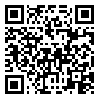دوره 9، شماره 3 - ( دوره نهم، شماره سوم، پاییز 1400 )
جلد 9 شماره 3 صفحات 53-41 |
برگشت به فهرست نسخه ها
Download citation:
BibTeX | RIS | EndNote | Medlars | ProCite | Reference Manager | RefWorks
Send citation to:



BibTeX | RIS | EndNote | Medlars | ProCite | Reference Manager | RefWorks
Send citation to:
Asadollahi P, Salarifar M H, Talebzadah Shoshtari L. The Effectiveness of Training Metacognitive Beliefs and State on Working Memory of Elementary School Students. CPJ 2021; 9 (3) :41-53
URL: http://jcp.khu.ac.ir/article-1-3434-fa.html
URL: http://jcp.khu.ac.ir/article-1-3434-fa.html
اسداللهی پریسا، سالاری فر محمدحسین، طالبزاده شوشتری لیلا. اثربخشی آموزش باورها و حالت فراشناختی بر حافظه کاری دانشآموزان دوره ابتدایی. فصلنامه روانشناسی شناختی. 1400; 9 (3) :41-53
دانشگاه بیرجند ، mhsalarifar@birjand.ac.ir
چکیده: (8441 مشاهده)
هدف پژوهش حاضر، بررسی اثربخشی آموزش باورها و حالت فراشناختی بر حافظه کاری دانشآموزان ابتدایی بود. روش پژوهش، براساس هدف کاربردی و برحسب گردآوری اطلاعات شبه آزمایشی با طرح پیشآزمون ـ پسآزمون با گروه گواه و یک مرحله پیگیری است. جامعه آماری این پژوهش شامل دانشآموزان ابتدایی مدارس دخترانه شهر بیرجند بود. با استفاده از روش نمونهگیری در دسترس، 46 نفر از دانشآموزان پایه ششم به عنوان نمونه پژوهش انتخاب و در دو گروه 23 نفری آزمایش و گواه جایگزین شدند. برای آموزش باورها و حالت فراشناختی از بسته آموزش فراشناختی و برای سنجش حافظه کاری از آزمون رایانهای بازشناسی تصاویر (N-Back) استفاده شد. دادهها با استفاده از آزمونهای یو مان-ویتنی، فریدمن و ویلکاکسون تحلیل شد. نتایج نشان داد، گروه آزمایش و گروه گواه در پس آزمون بایکدیگر تفاوت معناداری دارند و میانگین گروه آزمایش در حافظه کاری از میانگین گروه گواه بیشتر بود. نتایج آزمون پیگیری حاکی از ماندگاری اثربخشی آموزش بود. بهبیان دیگر آموزش فراشناختی، حافظه کاری را افزایش میدهد. بر اساس یافتههای پژوهش میتوان گفت، با استفاده از آموزش باورها و حالت فراشناختی، حافظه کاری دانشآموزان ابتدایی افزایش مییابد.
نوع مطالعه: پژوهشي |
موضوع مقاله:
روانشناسی شناختی
دریافت: 1400/3/9 | پذیرش: 1400/7/7 | انتشار: 1400/7/10
دریافت: 1400/3/9 | پذیرش: 1400/7/7 | انتشار: 1400/7/10
فهرست منابع
1. Baddeley, A. (2003). "Working memory and language: An overview." Journal of communication disorders, 36(3), 189-208. [DOI:10.1016/S0021-9924(03)00019-4]
2. Beaman, C. P., et al. (2014)."The effects of distraction on metacognition and metacognition on distraction: evidence from recognition memory." Frontiers in Psychology, 5, 439. [DOI:10.3389/fpsyg.2014.00439]
3. Beukers, A. O., et al. (2021). "Is Activity Silent Working Memory Simply Episodic Memory?" Trends in Cognitive Sciences, 25(4), 284-293. [DOI:10.1016/j.tics.2021.01.003]
4. Bozorgian, H., et al. (2020)." Metacognitive intervention and awarness:Listeners with low working memory capacity." International Journal of Listening, 1-14.
5. Bush, G., et al. (2008). "Functional magnetic resonance imaging of methylphenidate and placebo in attention-deficit/hyperactivity disorder during the multi-source interference task." Archives of General Psychiatry, 65(1), 102-114. [DOI:10.1001/archgenpsychiatry.2007.16]
6. Capobinaco, L., et al. (2019). "What comes First Metacognition or Negative Emotion? A Test of Temporal precedence." Frontiers in psychology. 10.2507. doi.org/10.3389/Fpsyg.2019.02507. [DOI:10.3389/fpsyg.2019.02507]
7. Chai, W. J., et al. (2018). "Working memory from the psychological and neurosciences perspectives: A review." Frontiers in Psychology, 9, Article 401.
https://doi.org/10.3389/fpsyg.2018.00401 [DOI:10.3389/fpsyg.2018.00401.]
8. Delaware, Ali. (2008). "Research methods in psychology and educational sciences." Tehran: Payame Noor University. [Persian].
9. Grinschgl, S., et al. (2020). "From metacognitive beliefs to strategy selection: does fake performance feedback influence cognitive offloading?" Psychological Research, 1-13. [DOI:10.1007/s00426-020-01435-9]
10. Hamedali, B., et al. (2021). "The Effectiveness of Cognitive Rehabilitation Therapy on Cognitive Functions (Working Memory, Concentration, and Attention) of Adolescents Living in Boarding Schools." Avicenna Journal of Neuro Psycho Physiology, 8(2), 96-101.
11. Komori, M. (2016)." Effects of working memory capacity on metacognitive monitoring: A study of group differences using a listening span test." Frontiers in psychology, 7, 285. [DOI:10.3389/fpsyg.2016.00285]
12. Jasiurkowski, S. (2021). "Memory, metacognition and problem solving." https://www.linkedin.com/pulse/memory-metacognition-problem-solving-dr-stan-jasiurkowski?trk=public_profile_article_view.
13. Jones, J. S., et al. (2020). "The academic outcomes of working memory and metacognitive strategy training in children: A double‐blind randomized controlled [DOI:10.1111/desc.12870]
14. trial." Developmental science, 23(4), e12870.
15. O'Grady, W. (2005)." How children learn language." Cambridge University Press, 50-52. [DOI:10.1017/CBO9780511791192]
16. Perfect, J.T. & Schwartz. B. L. (2004)." Applied metacognition (pp.15-39)." Cambridge university press.
17. Pradhan, S., & Das, P. (2021)." Influence of Metacognition on Academic Achievement and Learning Style of Undergraduate Students in Tezpur University." European Journal of Educational Research, 10(1), 381-391. [DOI:10.12973/eu-jer.10.1.381]
18. Salguero, J. M., et al. (2020)." Individual differences in anger and displaced aggression: The role of metacognitive beliefs and anger rumination." Aggressive Behavior, 46(2), 162-169. [DOI:10.1002/ab.21878]
19. Shin, J. (2020)."A meta-analysis of the relationship between working memory and second language reading comprehension: Does task type matter?" Applied Psycholinguistics, 41(4), 873-900. [DOI:10.1017/S0142716420000272]
20. Soleimani, E., et al. (2020)."The effectiveness of rehabilitation of cognitive-metacognitive strategies on visual memory and memory span in the elderly." Journal of Research in Psychopathology, 1(3), 16-23.
21. Spiess, M. A., et al. (2015)." Prospective memory, executive functions, and metacognition are already differentiated in young elementary school children." Swiss Journal of Psychology, 74(4), 229-241. [DOI:10.1024/1421-0185/a000165]
22. Sulaiman, T., et al. (2020)." Primary science teachers' perspectives about metacognition in science teaching." European Journal of Educational Research, (10)1, 75-84. doi: 10.12973/eu-jer.10.1.75 [DOI:10.12973/eu-jer.10.1.75]
23. Thongwichit, N., & Buripakdi, A. (2021)." A glimpse of metacognitive reading strategy instruction through modeling technique in ESP class at the tertiary level." LEARN Journal: Language Education and Acquisition Research Network, 14(1), 118-145.
24. Wells, A. (2011). "Metacognitive therapy for anxiety and depression:" Guilford press.
25. Wells, A. (2009). "Metacognitive Therapy for Anxiety and Depression."The Guilford Press. NewYork, NY.
26. Wells, A. (1995)." Meta-cognition and worry: A cognitive model of generalized anxiety disorder." Behavioural and cognitive psychotherapy, 23(3), 301-320. [DOI:10.1017/S1352465800015897]
27. Wells, A., & Matthews, G. (1996)." Modeling cognition in emotional disorder. The S-REF model." Behavior research and therapy. 34: 881-888. [DOI:10.1016/S0005-7967(96)00050-2]
ارسال پیام به نویسنده مسئول
| بازنشر اطلاعات | |
 |
این مقاله تحت شرایط Creative Commons Attribution-NonCommercial 4.0 International License قابل بازنشر است. |






